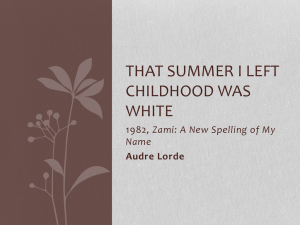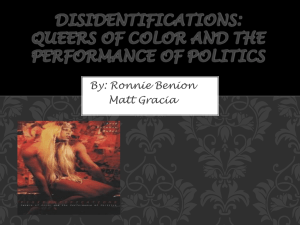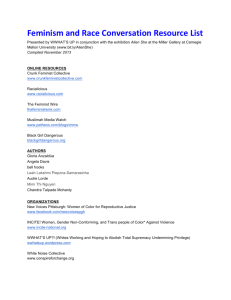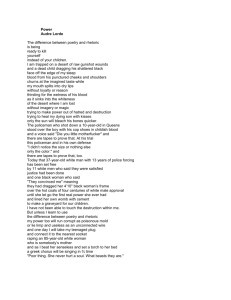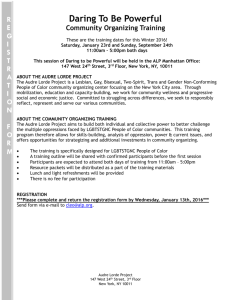Naziv studija
advertisement
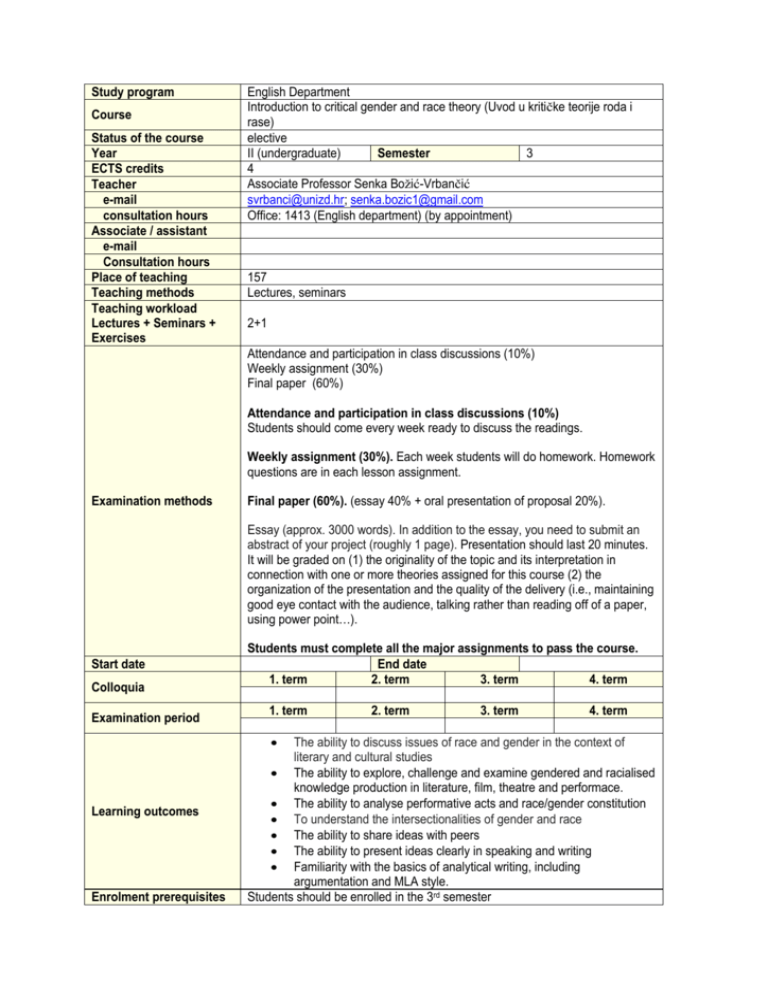
Study program Course Status of the course Year ECTS credits Teacher e-mail consultation hours Associate / assistant e-mail Consultation hours Place of teaching Teaching methods Teaching workload Lectures + Seminars + Exercises English Department Introduction to critical gender and race theory (Uvod u kritičke teorije roda i rase) elective II (undergraduate) Semester 3 4 Associate Professor Senka Božić-Vrbančić svrbanci@unizd.hr; senka.bozic1@gmail.com Office: 1413 (English department) (by appointment) 157 Lectures, seminars 2+1 Attendance and participation in class discussions (10%) Weekly assignment (30%) Final paper (60%) Attendance and participation in class discussions (10%) Students should come every week ready to discuss the readings. Weekly assignment (30%). Each week students will do homework. Homework questions are in each lesson assignment. Examination methods Final paper (60%). (essay 40% + oral presentation of proposal 20%). Essay (approx. 3000 words). In addition to the essay, you need to submit an abstract of your project (roughly 1 page). Presentation should last 20 minutes. It will be graded on (1) the originality of the topic and its interpretation in connection with one or more theories assigned for this course (2) the organization of the presentation and the quality of the delivery (i.e., maintaining good eye contact with the audience, talking rather than reading off of a paper, using power point…). Start date Colloquia Examination period Students must complete all the major assignments to pass the course. End date 1. term 2. term 3. term 4. term 1. term Learning outcomes Enrolment prerequisites 2. term 3. term 4. term The ability to discuss issues of race and gender in the context of literary and cultural studies The ability to explore, challenge and examine gendered and racialised knowledge production in literature, film, theatre and performace. The ability to analyse performative acts and race/gender constitution To understand the intersectionalities of gender and race The ability to share ideas with peers The ability to present ideas clearly in speaking and writing Familiarity with the basics of analytical writing, including argumentation and MLA style. Students should be enrolled in the 3rd semester Course subject This course offers an introduction to critical race and gender theory, an interdisciplinary academic field that explores critical questions about the meaning of race and gender in society. The primary goal of the course is to train students in the art of critical and analytical reading and thinking about race and gender. This course is interdisciplinary and students will have opportunity to work on areas of their own choosing (film, literature, theatre, performance, TV shows...). Required reading Additional reading Internet resources Audre Lorde. Age, Race, Class, and Sex: Women Redefining Difference. www.clc.wvu.edu/r/download/29781 Butler, Judith. "Imitation and Gender Insubordination." In The Critical Tradition, pp. 1707-18. Dyer, Richard. White. Visual Culture: the Reader. London: Sage. 2005, pp. 457-466. Foucault, Michel. "The History of Sexuality." In The Critical Tradition, pp. 1627-36. Lauter, Paul. “Race and Gender in the Shaping of American Literary Canon”. Feminist Studies 9. No. 3. McIntosh, Peggy, “White Privilege and Male Privilege” Moore “Racism in the English Language” Sedgwick, Eve Kosofsky. Touching Feeling: Affect, Pedagogy, Performativity. Duke UP, 2003. (selected parts) Segal, Lynne. “Sexualities”. Identity and Difference. London, Sage. 1997, pp. 184-235. Audre, Lorde. ‘Power’ The Collected Works of Audre Lorde, 1978, http://www.poetryfoundation.org/poem/240144#poem Berlant, Lauren. Poor Eliza. American Literature, Vol. 70, No. 3, No More Separate Spheres! Sep., 1998, pp. 635- 668. Butler, Judith. "Gender as Performance: An Interview with Judith Butler" (available online) Cvetkovich, Ann. An Archive of Feelings: Trauma, Sexuality, and Lesbian Public Cultures, Duke UP, 2003. (selected parts) Čale-Feldman, Lada and Ana Tomljenović, Uvod u feminističku književnu kritiku. Leykam International. 2012. (Književnost kao (patrijarhalna) institucija). Dolan, Jill. Utopia in Performance: Finding Hope at the Theater. Ann Arbor: Univ Michigan Press, 2005. (selected parts) Halberstam, Judith. “The Transgender Gaze in Boys Don’t Cry.” In The Visual Culture Reader. Nicholas Mirzoeff, ed. New York: Routledge, 2002: 669-673. Hill Collins, Patricia. From Black Power to Hip Hop: Racism, Nationalism and Feminism. Philadelphia, 2006., ch. 1. McRobbie, Angela. “Top Girls? Young women and the post-feminist sexual contract.” Cultural Studies, Vol. 21, Nos 4–5, July/September 2007, 718–737. Stewart, Kathleen. Ordinary Affects. Durham: Duke UP, 2007. (selected parts) Audre, Lorde. ‘Power’ The Collected Works of Audre Lorde, 1978, http://www.poetryfoundation.org/poem/240144#poem Stuart Hall on racism in media (jocks, stereotypes....) http://www.youtube.com/watch?v=gy57O9ZMENA Stuart Hall: Race: floating signifier Quality assurance Conditions for obtaining signatures Assignments of the credits for colloquia, seminars, exercises, exams Assignments of the final grade Remarks http://www.youtube.com/watch?v=bRk9MZvOd2c Judith Butler: Examined Life http://www.youtube.com/watch?v=k0HZaPkF6qE Public Feelings Salon with Lauren Berlant http://www.youtube.com/watch?v=rlOeWTa_M0U Affect in the end Time – conversation with Lauren Berlant https://ericastanleydotnet.files.wordpress.com/2012/05/affect-in-the-endtimes-berlant.pdf Course Evaluation is used to improve the quality of teaching and learning. The feedback from evaluation will help guide changes in future. Students should come every week ready to discuss the readings and their homework. 1 ECTS – attendance and participation (lectures) 1 ECTS – attendance and weekly homework (seminars) 1 ECTS – final paper 1 ECTS – oral presentation 10% Attendance and participation in class discussions 30% Homework 40% Essay 20% Oral presentation For those students who wish to read in greater depth about topics covered in this course, a number of books are available and placed in my office. Teaching topics - lectures No. Date 1. Introduction Title 2. The complexities of identities 3. Sexual identity and difference 4. Gender, sex and power 5. Whiteness 6. Gender and Performativity Literature Segal, Lynne. Sexualities. Identity and Difference. London, Sage. 1997, pp. 184235. Audre Lorde. Age, Race, Class, and Sex: Women Redefining Difference. Segal, Lynne. Sexualities. Identity and Difference. London, Sage. 1997, pp. 184235. Foucault, Michel. "The History of Sexuality." In The Critical Tradition, pp. 1627-36. McIntosh, Peggy, “White Privilege and Male Privilege” Or Dyer, Richard. White. Visual Culture: the reader. London: Sage. 2005, pp. 457-466. Sedgwick, Eve Kosofsky. Touching Feeling: Affect, Pedagogy, Performativity. Duke UP, 2003. (selected parts) 7. The body as a complex and contested domain 8. Femininity and masculinity: ordinary feelings 9. Reproductive politics: public and private 10. Trans and queer gender Film: Boys Don’t Cry 11. Affect theory 12. Sexualised racial body: ambivalence 13. Intersectionality of Race and Gender 14. Intersectionality of Race and Gender 15. Closing lecture Seminars (students will be advised at the beginning of the semestar) No. Date Title (students will be advised at the beginning of the 1. semestar) 2. 3. 4. 5. 6. 7. 8. 9. 10. Butler, Judith. "Gender as Performance: An Interview with Judith Butler" Butler, Judith. "Imitation and Gender Insubordination." In The Critical Tradition, pp. 1707-18. Berlant,Lauren. Live Sex Acts (Parental Advisory: Explicit Material). The Queen of America goes to Washington City: Essays on Sex and Citizenship. London, Duke University Press. 1997, pp.5580. Halberstam, Judith. “The Transgender Gaze in Boys Don’t Cry.” In The Visual Culture Reader. Nicholas Mirzoeff, ed. New York: Routledge, 2002: 669-673. Stewart, Kathleen. Ordinary Affects. Durham: Duke UP, 2007. (selected parts) Hill Collins, Patricia. From Black Power to Hip Hop: Racism, Nationalism and Feminism. Philadelphia, 2006., ch. 1. Moore “Racism in the English Language” Lauter, Paul. Race and Gender in the Shaping of American Literary Canon. Berlant, Lauren. Poor Eliza. American Literature, Vol. 70, No. 3, No More Separate Spheres! Sep., 1998, pp. 635668. Literature 11. 12. 13. 14.
